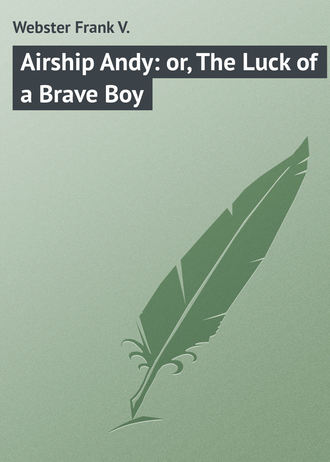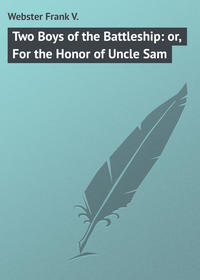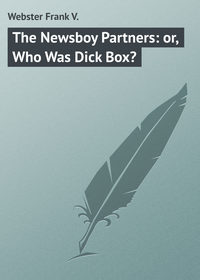 полная версия
полная версияAirship Andy: or, The Luck of a Brave Boy
They made another ascent the next morning. Air and breeze conditions were most favorable for the try-out. Seated amidships, wearing a leather jacket, cap and gloves, Andy had the motor keyed up to its highest speed. The quick sequence of its exhaust swelled like a rapid-fire gun.
The machine rolled forward, the propellers beat the air, and the Racing Star rose on a smooth parabola. Andy attempted some volplane skits that were fairly hair-raising. He raced with real birds. He practiced with the wind checks. For half an hour he kept up a series of practice stunts of the most difficult character.
“Oh, but you’re a crack scholar, Andy Nelson,” declared the delighted Parks, as the Racing Star came to moorings again, light as a feather.
“I think myself I am getting on to most of the curves,” said Andy. “The only question is can I keep it up on a long stretch?”
“Practice makes perfect, you know,” suggested Mr. Morse.
Andy felt that he had about reached the acme of his mechanical ambition. When he went to bed that night the thought of the coming race kept him awake till midnight. When he finally went to sleep, it was to dream of aerial flights that resolved themselves into a series of the most exciting nightmares.
No developments came from Andy’s experience with the Duske crowd. Once in a while he worried some over the reference of Duske’s companions to seeing his name in the newspapers.
“Either it was about my trouble at Princeville, or some of these reporters writing up the race got my name incidentally,” decided Andy.
“Anyhow, I can’t afford to trouble about it.”
Andy rarely ventured away from the camp after dark. In fact, ever since entering the employment of Mr. Parks he had not mixed much with outsiders. He had his Princeville friends and the Duske crowd constantly in mind. But one hot evening he went forth for some ice cream for the crowd.
The distance to a town restaurant was not great. Andy hurried across the freight tracks. Just as he passed a switchman’s shanty, he fancied he heard some one utter a slight cry of surprise. Two persons dodged back out of the light of a switch lantern. Andy, however, paid little attention to the episode. He reached the restaurant, got the ice cream in a pasteboard box, and started back for the camp without any mishap or adventure.
Just as Andy crossed a patch of ground covered with high rank weeds, he became aware that somebody was following him. A swift backward glance revealed two slouching figures. They pressed forward as Andy momentarily halted.
“Now then!” spoke one of them suddenly.
Andy dodged as something was thrown towards him, but not in time to avoid a looped rope. It was handled deftly, for before he knew it his hands were bound tightly to his side.
One of the twain ran at him and tripped him up. The other twined the loose line about Andy’s ankles.
“Got him!” sounded a triumphant voice.
“Good business,” chirped his companion, and then Andy thrilled in some dismay, as he recognized his captors as Gus Talbot and Dale Billings.
“Hello, Andy Nelson,” said Gus Talbot.
Gus’s voice was sneering and offensive as he hailed the captive. His companion looked satisfied and triumphant as he stood over Andy, as if he expected their victim to applaud him for doing something particularly smart.
“See here, Gus,” observed Dale, “I’d better get, hey?”
“Right off, too,” responded Gus. “If there’s the ready cash in it, all right. If there isn’t we’ll get him on the way to Princeville ourselves some way.”
“Can you manage him alone?”
“I’ll try to,” observed Gus vauntingly, “I’ll just have a pleasant little chat with him for the sake of old times, while I sample this ice cream of his – um-um – it ought to be prime.”
Dale sped away on some mysterious errand. Gus picked up the box of ice cream that Andy had dropped and opened it. He tore off one of its pasteboard flaps, fashioned it into an impromptu spoon, and proceeded to fill his mouth with the cream.
“Don’t you get up,” he warned Andy. “If you do, I’ll knock you down again.”
“Big Injun, aren’t you!” flared out Andy, provoked and indignant – “especially where you’ve got a fellow whipsawed?”
“Betcher life,” sneered Gus maliciously. “Things worked to a charm. Got a hint from some airship fellows that you was somewhere around these diggings. Watched out for you and caught you just right, hey?”
The speaker sat down among the weeds in front of Andy. The latter noticed that his face was grimed and his hands stained with dirt. His clothes were wrinkled and disordered as if he had been sleeping in them. From what he observed, Andy decided that the son of the Princeville garage owner and his companion were on a tramp. They looked like runaways, and did not appear to be at all prosperous.
“Say,” blurted out Gus, digging down into the ice cream, as if he was hungry, “you might better have turned up that two hundred dollars for dad.”
“Why had I?” demanded Andy.
“It would have saved you a good deal of trouble. It’s a stroke of luck, running across you just as we’d spent our last dime. How will you like to go back to Princeville and face the music?”
“What music?”
“Oh, yes, you don’t know! Haven’t read the papers, I suppose? Didn’t know you was wanted?”
“Who wants me?”
“Nor that a reward was out for you?”
“Why?”
“Say, are you so innocent as all that, or just plain slick?” drawled Gus, with a crafty grin.
“I don’t know what you are talking about.”
“Farmer Jones’ barn.”
“Oh – ” Andy gave a start. He began to understand now. “What about Farmer Jones’ barn?”
“You know, I guess. It was set on fire and burned down. They have been looking everywhere for the firebug, and offer a fifty-dollar reward.”
“Is that the reason why you and Dale have left Princeville?” demanded Andy coolly.
“Eh, well, I guess not,” cried Gus. “Huh! Everybody knows how you did it out of spite against Jones because he hindered you running away from dad. Why, they found your cap right near the barn ruins.”
“Is that so?” said Andy quietly. “How did it get there?”
“How did it get there? You dropped it there, of course.”
“Purposely to get blamed for it, I suppose?” commented Andy. “That’s pretty thin, Gus Talbot, seeing that you know and your father knows that my cap was taken away from me when he locked me up at the garage, and I had no chance to get it later. You left the cap near the burned barn, Gus Talbot, and you know it.”
“Me? Rot!” ejaculated Gus, but he stopped eating the ice cream and acted restless.
“In fact,” continued Andy definitely, “I can prove that both you and Dale were sneaking about the Jones’ place a short time before the fire broke out.”
“Bosh!” mumbled Gus.
“Further than that, I can tell you word for word what passed between you two. Listen.”
Andy remembered clearly every incident of his flight from the haystack in Farmer Jones’ field. He recited graphically the appearance of Gus and Dale, and the remark he had overheard. Gus sat staring at him in an uneasy way. He acted bored, and seemed at a loss to answer.
It was more than half an hour before Dale returned. He acted glum and mad.
“Is it all right?” inquired Gus eagerly.
“Right nothing!”
“Get the money?”
“No.”
“What’s the trouble?”
“I saw a constable and told him I could give him a chance to make a fifty-dollar reward, us to get ten. He heard me through and said it wouldn’t do.”
“Why wouldn’t it?” demanded Gus.
“Because this is in another county, and he’d have to get the warrant. Said it was too much trouble to bother with it.”
“Humph! what will we do now?” muttered Gus in a disgusted way.
“That’s easy. Get Andy over the county line, and find someone else to take the job off our hands,” replied Dale Billings.
CHAPTER XIII – JIU-JITSU
“Come on,” ordered Gus to Andy, unfastening the end of the rope and giving it a jerk.
“Hey, not that way,” dissented Dale.
“Why not?”
“Think you can parade him through the town without attracting attention? We’ve got to be careful to cut out from here without a soul seeing us till we strike a country road. You march,” commanded Gus anew to his captive, heading in another direction. “And you just so much as peep if we meet anybody, and you get a whack of this big stick.”
Andy submitted to circumstances. He figured out that it would be some time before his captors could perfect their arrangements for interesting some officer of the law in their scheme. He readily guessed that for some reason or other they did not wish or dare to return personally to Princeville. Andy calculated that it was nearly ten miles to the county line. He believed he would have half a dozen chances to break away from his captors before they reached it.
“Huh, what you going to do now?” inquired Gus in a grumbling tone, as they came directly up against a high board fence.
“You wait here a minute,” directed Dale.
The speaker ran down the fence in one direction to face at its end a busy field occupied by aviation tents. He tried the opposite direction to find matters still worse, for there the fence ended against a lighted street of the town.
“What’s beyond the fence?” inquired Gus.
“Not much of anything – a sort of a prairie,” reported Dale, peering through a crack in the fence.
“We can’t scale it.”
“Not with Andy in tow. Here we are, though.”
Dale had discovered a loose board. He began tugging at its lower end, and succeeded in pulling it far enough out to admit of their crowding through the opening. He went first, grabbing and holding Andy till Gus made the passage.
“Keep away from those lights over yonder,” ordered Dale, indicating a point on the broad expanse where some aeroplane tents showed. “This way, I tell you,” he added in a hoarse, hurried whisper. “There’s a man.”
Andy pushed forward, came to a dead halt, bracing himself as his captors tried to pull him out of range of a man seated on a hummock, apparently watching some night manœuvres of airships over where the lights showed.
“Mister, oh, mister!” shouted Andy.
He received a blow on the mouth from the fist of Gus, but that did not prevent him from renewing the outcry. The man sprang quickly to his feet and came towards them.
He was small, thin, dark-faced, and so undersized and effeminate-looking that Andy at once decided that he would not count for much in a tussle with two stout, active boys. Dale thought so, too, evidently, for he squared up in front of Andy, trying to hide him from the view of the stranger, while Gus attempted to pull his captive back towards the fence. Andy, however, gave a jerk that drew Gus almost off his feet, and a bunt to Dale that sent him forcibly to one side.
“What is this?” spoke the stranger in a soft, mellow, almost womanly tone of voice. “Did some one then call?”
“It was I,” proclaimed Andy. “These fellows have tied me up and are trying to kidnap me.”
“It is wrong, I will so investigate,” said the little man, coming straight up to the group and scanning each keenly in turn.
“See here,” spoke Dale, springing in front of the man, “this is none of your business.”
“Oh, yes, it is,” returned the stranger in the same gentle, purring way. “I am interested. Speak on, young man.”
“Get him away!” directed Dale in a sharp whisper to Gus.
Then, quick as lightning, he made a pass at the stranger. He was double the weight of the latter and half a head taller. Andy expected to see his champion flatten out like the weakling he looked.
“Ah,” said the latter, “it is so you answer questions. My way, then.”
What he did he did so quickly that Andy could not follow all of his movements. The hands of the little man moved about like those of an expert weaver at the loom. The result was a marvel. In some way he caught Dale around the neck. The next moment he swung him from the ground past his shoulder and his adversary landed with a thump.
Gus dropped the rope and ran at the stranger, club uplifted. Again the wiry strength of the little man was exerted. He seemed to stoop, and his arms enclosed Gus about the hips. There was a tug and tussle. Gus was wrenched from his footing, and went skidding to the ground, face down, for nearly two yards.
“Thunder!” he shouted, wiping the sand from his mouth.
“Go,” said the stranger, advancing upon the prostrate twain, who scrambled promptly to their feet.
Both dove for the loose plank in the fence and disappeared through it. The stranger drew out a pocket-knife and relieved Andy of his bonds.
“I look at you and then at those two,” he said simply, “and your face tells me the true story. Where would you go?”
Andy pointed in the direction of the Parks’ Aerodome, and the man walked by his side in its direction.
“I don’t care to have those fellows find out where I am working,” explained Andy. “Mister,” he added admiringly, “how did you do it?”
“It was simple jiu-jitsu.”
“Eh? Oh, yes, I’ve heard of that,” said Andy, but vaguely. “It’s a new Japanese wrestling trick, isn’t it?”
“I am from Japan,” observed his companion with a courteous dignity of manner that impressed Andy.
“I see,” nodded Andy, “and you come from a wonderful people.”
“We strive to learn,” replied his companion. “That is why I am here. I was sent to this country to study aeronautics. Besides that, the science has a peculiar attraction for me. My father was chief kite maker to the family of the Mikado.”
“Is it possible?” said Andy.
“I therefore have an absorbing interest in your airmen and their daring work. You must know that we make wonderful kites in my home country.”
“I have heard something of it,” said Andy.
“Two hundred years ago many of the principles now used in your airships were used in our kite flying, only we never tried to fly ourselves.”
“We have a gentleman up at our camp who would be just delighted to talk with you,” declared Andy enthusiastically. “He is an inventor, a Mr. Morse.”
“I should like to meet him,” said the Japanese.
“Then come right along with me,” invited Andy cordially; “only, say, please, don’t mention the fix you found me in.”
“It shall be so,” declared his companion.
Andy made sure that his recent captors were not following them as they made a cut across a field and reached the Parks’ camp. He led his guest into the sitting room of the living building, to find his employer and Mr. Morse there. Andy introduced his companion. It did not take long for the inventor to discover a kindred spirit in the Japanese, who gave his name as Tsilsuma.
That night after he had got into bed Andy wondered if he had not better tell Mr. Morse or his employer his entire story, and the former about the near proximity of his old-time enemy, Duske. Then, too, he worried some over the appearance of Gus and Dale and his daily risk of being arrested. With daylight, however, Andy forgot all these minor troubles.
There was to be a race for a small prize that afternoon on the aviation field, and Parks had arranged for the Racing Star to participate. The aeronaut was busy half the morning seeing to the machine, while Mr. Morse flitted about adjusting a device suggested by the intelligent Tsilsuma for folding the floats under the aeroplane. The Japanese, too, had suggested sled runners in front and wheels at the rear for starting gear.
The Racing Star had not appeared in the general field before, and this was a kind of qualification flight. Just after two o’clock Parks made his final inspection of the bearings of the motors and the word to go was given. Andy sailed over the railroad tracks and landed in the field half a mile distant, with a dexterity that made his rivals there take a good deal of notice of him and the Racing Star.
When the word came Andy started the motor, and a friend of the aeronaut tugged at the propellers. With a blast that resembled a cyclone the airship started.
The helpers worked at the rudders, and after a run of only seventy-five feet the Racing Star shot up into the air.
Andy tried a preliminary stunt that he had practiced for two days past. It was to fly around the field in a figure eight at a height of ninety-five feet. Then, just to test the excellency of the machine, he plunged for the ground.
“The boy will kill himself!” shouted the man in charge of the race, but just at the critical moment Andy shifted his steering planes and flew across the ground, barely skimming the grass.
Once in this fashion he went around the course, then another upward lunge and he circled back to the starting point and came gently to earth. The crowds sent up an enthusiastic roar.
Four other machines made their exhibition in turn. Two went through a clumsy process, one became disabled, and the other retired with the derisive criticism of “Grasshopper!” as its pilot failed to lift it more than ten feet from the ground at any time.
“Mind the wind checks, Andy, lad,” warned John Parks anxiously, as the three aeroplanes were ranged for the prize test of a mile run around the course.
“I’ll be the pathfinder or nothing!” declared Andy, his eyes bright and observant, his nerves tingling with the excitement of the moment.
“Go!”
The three powerful mechanical birds arose in the air, dainty creations of grace and beauty, Andy in the lead. Then his nearest competitor passed him. Then No. 3 shot ahead of the other two, and then the turn.
“Huzza!” breathed Parks.
At his side, safe from recognition in his great disfiguring goggles, Mr. Morse moved restlessly from foot to foot. The Racing Star had accomplished what he had worked so hard to bring about – a true circle in a rapid turn.
The two other machines bungled. One nearly upset. Down the course came Andy, headed like an arrow for the starting point. A slanting dive, and the Racing Star skimmed the ground fully five hundred feet in advance of the nearest opponent.
Watch in hand, John Parks ran up to Andy, his face aglow with professional pride and delight.
“Won the race – but better than that you have beat the home record by eight seconds!”
“Winner, the Racing Star,” sang out the starter.
And then he added:
“Time: forty-eight seconds and seven-eighths.”
“Hurrah!” shouted John Parks, throwing his hat in the air.
CHAPTER XIV – THE OLD LEATHER POCKETBOOK
“No sky-sailing to-day, Andy,” said John Parks, the aeronaut.
“I guess you are right,” answered Andy.
“A rest won’t do you any harm. There are three days before the last event, and plenty of time to try Morse’s new wrinkles.”
“I think I’ll go and see what the latest one is,” said Andy.
It was a rainy day with a strong breeze, and waste of time, Andy well knew, to attempt any flights under the conditions. He went to the workshop to find Mr. Morse and the Japanese deep in discussion over some angle of a new reversible plane, they called it. Tsilsuma had become almost a fixture at the Parks’ camp. He was unobtrusive generally, but his instincts and mission to delve and absorb were accommodated and encouraged by the inventor, and a strong friendship had sprung up between the two.
Andy wandered about promiscuously, time hanging heavily on his hands. Finally he settled down in the comfortable sitting room looking over some books on scientific subjects, and picking out here and there a simple fact among a group of very abstruse ones.
“If ever I get any money ahead,” he observed, “I’ll put some of it into education, and I’ll study up aeronautics first thing. It seems as if it’s natural for me to see right through a machine first time I see it, but I don’t understand the real principles, for all that. No, sir, it’s brains like Mr. Morse has got that counts. If sky-sailing is going to last, and I follow it up, I’m going to dig deep right down into it, college fashion, and really understand my business. Hello!”
Andy had laid aside the scientific book and had taken up a newspaper. Glancing over its columns, his eye became fixed upon an advertisement occupying a prominent position just under some local reading matter. This is what it read.
Notice – Important!Lost – Somewhere on a train between Macon and Greenville, an old leather pocketbook, marked Robert Webb, Springfield, and containing $200. The finder may keep the money, and upon return of the pocketbook will be handsomely rewarded.
West, Thorburn & Castle, Attorneys,Butler Block, Greenville“Well,” aspirated Andy energetically, “here’s something new!”
The incident stirred up his thought so much that he found himself walking the floor restlessly. Andy had a vivid imagination, and he built up all kinds of fancies about the singular advertisement.
“Wonder what lies under all this?” ruminated Andy. “They don’t want the two hundred dollars, and they offer more money to get back that old pocketbook! They will never get the whole of it, though, that’s certain. Gus Talbot tore off the flap of it. The rest of it – lying in my old clothes in that shed on the Collins farm, where I helped drive those geese. There was nothing left in the pocketbook, I am sure of that. What can they want it for, then? Evidently Mr. Webb didn’t get my postal card.”
Andy could not figure this out. He found it impossible, however, to dismiss the subject from his mind.
“People don’t go to all the bother that advertising shows,” he reasoned, “unless it’s mighty important. Can I get the pocketbook, though, after all. I threw it carelessly up on a sort of a shelf in that old shed, and it may have been removed and destroyed with other rubbish. I’ve got the day before me, with nothing to do. I wouldn’t be at all sorry if the two hundred dollars came my way in a fair, square manner. I’ll run down to Greenville. It won’t take four hours, there and back. I’ll see what there is to this affair – yes, I’ll do it.”
Andy sought out Mr. Parks and told him he was going to take a run down to Greenville on business, and would be back by evening at the latest. He caught a train about ten o’clock, and noon found him at the door of the law offices of West, Thorburn & Castle, Butler Block. Our hero entered one of three offices, where he saw a gentleman seated at a desk.
“I would like to see some member of the firm,” he said.
“I am Mr. West,” answered the lawyer.
“It is about an advertisement you put in the paper about a lost pocketbook,” explained Andy.
“Oh, indeed,” said Mr. West, looking interested at once, and arising and closing the door. “Do you know something about it?”
“I know all about it,” declared Andy. “In fact, I found it only a few minutes after it was lost.”
“On the train?”
“No, sir. Mr. Webb did not lose it on the train.”
“He thinks he did.”
“He is mistaken,” said Andy. “He lost it in an automobile that took him on a rush run from Princeville across country to Macon. I was his chauffeur, and found it.”
“Where is the pocketbook?” inquired the lawyer eagerly. “Have you brought it with you?”
“No, sir; but I think I can get it.”
“We will make it richly worth your while,” said Mr. West.
“There is something I had better explain about it,” said Andy.
“Spent the two hundred dollars?” insinuated the lawyer, with an indulgent smile.
“Oh, no – the two hundred dollars is waiting for Mr. Webb to claim it with Mr. Dawson, the banker at Princeville. Let me tell you my story, Mr. West, and then you will understand better.”
Andy told his story. He had a surprised, but intent listener. When he had concluded, the lawyer shook his hand warmly.
“Young man, you are a good, honest young fellow, and you will not regret acting square in this affair. Mr. Webb did not get your postal card, because he is no longer located at Springfield. How far from here is the farm you spoke of where you left the pocketbook?”
“About eighteen miles, I should think.”
“Can you get there by rail?”
“Within two miles of it.”
“And soon?”
“Why, yes, sir,” replied Andy, glancing at his watch. “There is a train west in a quarter of an hour.”
“At any expense,” said Mr. West earnestly, “get there and return with the pocketbook. As to your reward – ”
“Don’t speak of it,” said Andy. “Mr. Webb treated me handsomely when I brought him over to Macon. I can’t imagine, though, why he puts so much store by the pocketbook.”






